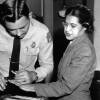This post is about to recommend that you read two fairly long stories about Polish politics.
It's worth it, I promise. They offer twin views on a story that's not just important geopolitically — it's fascinating on a human level.
Here's how The Guardian opens its examination of the mysterious crash that has reshaped the Polish psyche — not to mention Poland's government:
"The tips of the birch trees barely pierced the fog. The aerial visibility on the approach to Smolensk in western Russia was just 200 metres. On its final approach, the Tupolev's warning system repeatedly sounded: 'Pull up, pull up.' But the crew of the aircraft appeared to react too late. At 10.41am on 10 April 2010, it crashed a few hundred metres short of the runway, killing all 96 people aboard."
That plane, you may recall, was carrying Poland's president, Lech Kaczynski, as well as dozens of other prominent members of the government and military. The crash threw Poland into mourning.
Investigators found it to be the result of human error. But there's an alternate narrative in Poland — one that holds it was sabotage, a Russian plot, concealed by Kremlin interference with the investigations.
The ruling Law and Justice party has now launched a new inquiry that will undoubtedly reopen barely-healed wounds ... and raise tensions with Russia at a time when Poland is also straining its political bonds with Europe.
Not interested yet?
Here's The Associated Press on the man who pulls the strings in Poland today, a man obsessed with the idea of Russian sabotage, a man who was once prime minister but currently holds no office, a man who has worn only black since 2010 ... when his twin brother, the president of Poland, died in a plane crash:
"When Hungary's prime minister had a secret five-hour meeting in a secluded mountain resort with the most powerful person in Poland, he didn't convene with his counterpart or the Polish president."Instead he spoke with Jaroslaw Kaczynski, the leader of Poland's ruling party, a man who has no official government position....Observers say Jaroslaw Kaczynski changed dramatically after the death of his twin."He hardened. He is a lonely man and this is very visible in the way he does politics. He wants to rule with a strong hand," ... says Kazimierz Marcinkiewicz, who was prime minister in a Law and Justice government in 2005-2006.
The Kaczynski twins were once child stars — acting in a famous Polish film together. They joined Lech Walesa's anti-Communist movement in the '80s.
And they were impossible to tell apart, The Guardian writes, "except for the cat hairs that could sometimes be spotted on Jarosław's dark clothes."
"Of the two, Lech was the more likable, with a sense of humour and fun, and a successful marriage," the newspaper continues. "Jarosław cannot drive or use a computer, seems to live as a recluse and is an eternal bachelor. But he was always politically more astute than his brother. They needed one another." 'In the past, it was very easy to ridicule the Kaczyńskis ... ' says [the president of the Institute of Public Affairs in Warsaw, Jacek] Kucharczyk. 'Now Jarosław is dangerous. He seems to be using his brother's memory, and he may be vengeful.' "
In short, the death of Lech Kaczynski didn't just throw his nation into a tailspin — it tore at his powerful brother, too, which may have repercussions not just for the country but for all of Europe.
The Guardian has the full story about the crash, the sabotage theories and how feeding the national obsession with the president's death could promote Polish nationalism and imperil European stability.
Copyright 2016 NPR. To see more, visit http://www.npr.org/.



